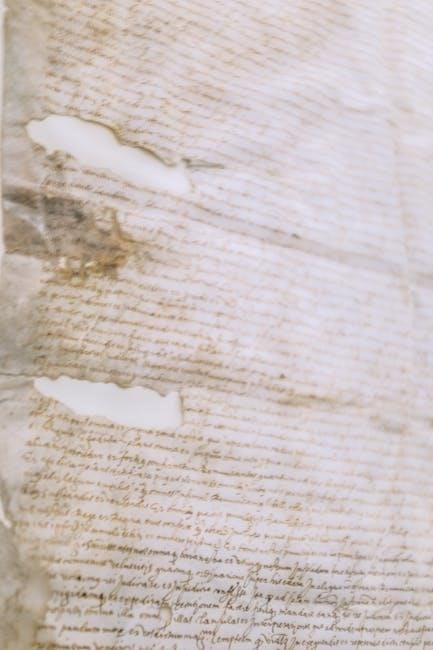
John Proctor‚ a complex character in The Crucible‚ is often viewed as a tragic figure due to his moral flaws and ultimate downfall‚ making him a villain in the eyes of many․
Overview of John Proctor’s Character
John Proctor‚ a Salem farmer‚ is a complex figure with a mix of noble and flawed traits․ Respected in his community‚ he struggles with moral failings‚ notably his affair with Abigail Williams․ His internal guilt and external pressures drive his decisions‚ leading to tragic consequences․ Proctor’s journey reveals a man torn between integrity and hypocrisy‚ ultimately facing a devastating downfall․ His character serves as a focal point for exploring themes of morality‚ redemption‚ and the destructiveness of unchecked power․
Context of “The Crucible” Play
The Crucible‚ written by Arthur Miller‚ is set in 1692 Salem‚ Massachusetts‚ during the infamous Salem witch trials․ The play explores a society gripped by hysteria‚ fear‚ and superstition‚ where accusations of witchcraft escalate into mass panic․ This historical context highlights the dangers of unchecked power‚ false accusations‚ and the destructive nature of fear․ The trials serve as a backdrop to examine human frailty‚ moral compromise‚ and the consequences of unchecked paranoia․ The play’s setting underscores the tension between individual integrity and societal pressure‚ shaping the characters’ actions and fates․

Analysis of John Proctor as the Villain
John Proctor’s flaws‚ such as his past affair with Abigail‚ and his reluctance to expose the truth‚ contribute to his role as a tragic villain in the play․
Role in the Salem Witch Trials
John Proctor’s involvement in the Salem witch trials is pivotal‚ as his initial reluctance to confront the court and his eventual accusation amplify the hysteria․ His past affair with Abigail Williams creates tension‚ fueling her vengeful motives․ Proctor’s delayed honesty and refusal to confess to witchcraft highlight his moral struggle‚ ultimately leading to his execution․ His actions‚ though noble in intent‚ inadvertently contribute to the trials’ chaos‚ solidifying his complex role as both victim and villain․
Tragic Flaws and Moral Dilemmas
John Proctor’s tragic flaws‚ such as his pride and past infidelity‚ lead to his moral dilemmas․ His affair with Abigail Williams creates guilt and vulnerability‚ while his refusal to confess to witchcraft to protect his reputation highlights his internal struggle․ Proctor’s pride initially prevents him from seeking help‚ exacerbating his situation․ His moral dilemmas stem from choosing between honesty and survival‚ ultimately leading to his downfall․ These flaws make him a tragic figure‚ as his mistakes and inability to forgive himself seal his fate in the play․
Impact on the Plot and Other Characters
John Proctor’s actions significantly influence the plot and other characters․ His affair with Abigail sparks her vengeance‚ driving the witch trials․ Proctor’s accusation of witchcraft against his wife‚ Elizabeth‚ and his eventual confession attempt to save her‚ shape the narrative’s tension․ His interactions with Reverend Hale and Judge Danforth reveal the court’s corruption․ Proctor’s courage in refusing to falsely confess inspires others‚ like Rebecca Nurse‚ but also accelerates his demise․ His impact on characters like Abigail and Mary Warren underscores the play’s themes of guilt‚ redemption‚ and the destructive power of unchecked ambition․
Script Overview and Themes
The script explores themes of guilt‚ redemption‚ and power dynamics‚ highlighting John Proctor’s moral struggles and the societal hysteria driving the Salem witch trials․
Themes of Guilt and Redemption
John Proctor’s journey in The Crucible is deeply rooted in themes of guilt and redemption․ His affair with Abigail Williams haunts him‚ fueling his internal torment and moral conflict․ As the play progresses‚ Proctor’s guilt transforms into a quest for redemption‚ evident in his courageous stand against the witch trials and his refusal to falsely confess․ His ultimate sacrifice symbolizes his attempt to reclaim his moral integrity‚ offering a poignant exploration of human frailty and the struggle for redemption amidst overwhelming societal hysteria․
Power Dynamics and Manipulation
In The Crucible‚ John Proctor becomes entangled in a web of power dynamics and manipulation‚ primarily orchestrated by Abigail Williams․ Abigail’s influence over the court and her ability to manipulate others’ perceptions drive the witch trials forward․ Proctor‚ while attempting to assert his moral authority‚ is ultimately victimized by these power struggles․ His refusal to yield to Abigail’s control underscores his own internal conflict‚ highlighting how manipulation can both empower and destroy individuals within the play’s oppressive societal framework․

Character Development and Motivations
John Proctor’s motivations stem from his internal struggle for self-respect‚ moral integrity‚ and the desire to protect his family‚ driving his actions amid Salem’s chaotic witch trials․
Internal Conflicts and External Pressures
John Proctor faces intense internal conflicts‚ particularly his guilt over his affair with Abigail‚ which fuels his moral struggles․ Externally‚ the oppressive Salem society and the relentless witch trials pressure him to conform or face condemnation․ His refusal to falsely confess to witchcraft highlights his internal battle for integrity․ The fear of losing his family and reputation further intensifies these pressures‚ ultimately leading to his tragic demise․ These conflicts and pressures shape his decisions and define his role in the play․

Historical Context and Relevance
Set during the Salem witch trials in 1692‚ John Proctor’s story reflects the hysteria and paranoia of the era․ Arthur Miller’s play‚ written in 1953‚ mirrors McCarthyism‚ highlighting themes of fear‚ false accusations‚ and the dangers of unchecked power‚ making Proctor’s struggle universally relevant․
Parallels with McCarthyism and Modern Issues
John Proctor’s story in The Crucible mirrors the McCarthyism era‚ where fear and false accusations dominated society․ The Salem witch trials and McCarthyism both highlight the dangers of mass hysteria‚ false accusations‚ and the abuse of power․ In both contexts‚ innocent individuals were targeted‚ leading to their downfall․ These themes resonate today‚ as modern issues like cancel culture and political polarization echo similar patterns of fear-driven judgment․ The play serves as a timeless warning against unchecked power and the consequences of societal fear․
Modern Interpretations and Adaptations
Modern audiences often reinterpret John Proctor’s character‚ emphasizing his complexities and flaws․ Contemporary adaptations highlight his struggle with morality‚ resonating with themes of guilt and redemption․
Contemporary Views on John Proctor’s Villainy
Modern interpretations often portray John Proctor as a multifaceted character‚ blending heroism and villainy․ His flaws‚ such as past infidelity‚ contribute to his downfall‚ making him a tragic figure․ Contemporary audiences see his refusal to falsely confess as noble‚ yet his initial moral failings underscore his complexity․ This duality makes him a sympathetic villain‚ as his actions stem from human weakness rather than pure malice․ His story resonates with themes of guilt‚ redemption‚ and the consequences of sin‚ appealing to modern sensibilities and sparking debates about morality and justice․

Resources for Further Study
Explore study guides‚ analysis‚ and scripts like The Crucible to delve into John Proctor’s role․ Use tools like Quizlet for flashcards and script PDFs for deeper insight into his character and the play’s themes․
Recommended Scripts and Analysis
For deeper insight into John Proctor’s role as a villain‚ explore scripts and analyses of The Crucible․ Resources like Quizlet offer flashcards and study guides‚ while free script PDFs provide direct access to dialogue and scenes highlighting Proctor’s moral dilemmas․ Additionally‚ critical essays and character studies analyze his actions and their implications‚ offering a comprehensive understanding of his villainous traits and the play’s broader themes․
John Proctor’s tragic flaws and moral failures ultimately define his role as a villain‚ highlighting the destructive power of guilt and deception in The Crucible․
Final Thoughts on John Proctor’s Role
John Proctor’s role as a villain in The Crucible is defined by his moral flaws and the consequences of his actions․ His affair with Abigail and initial reluctance to confront the witch trials highlight his weaknesses․ However‚ his ultimate sacrifice to protect his name and family redeems his character‚ showcasing a complex interplay of guilt‚ pride‚ and redemption․ Proctor’s journey reflects the destructive nature of unchecked power and deception‚ making him a pivotal yet tragic figure in the play’s exploration of human morality and societal hysteria․